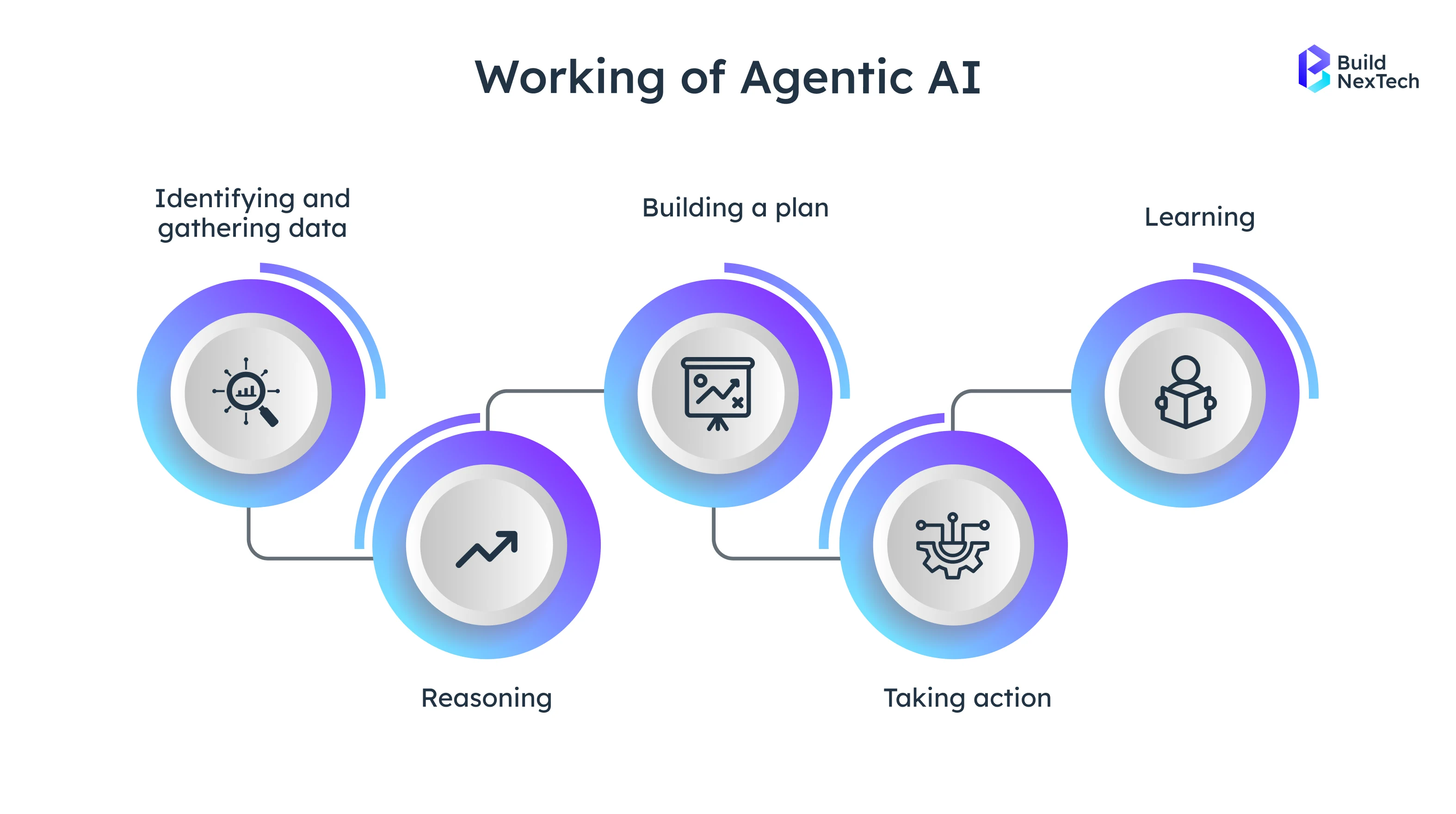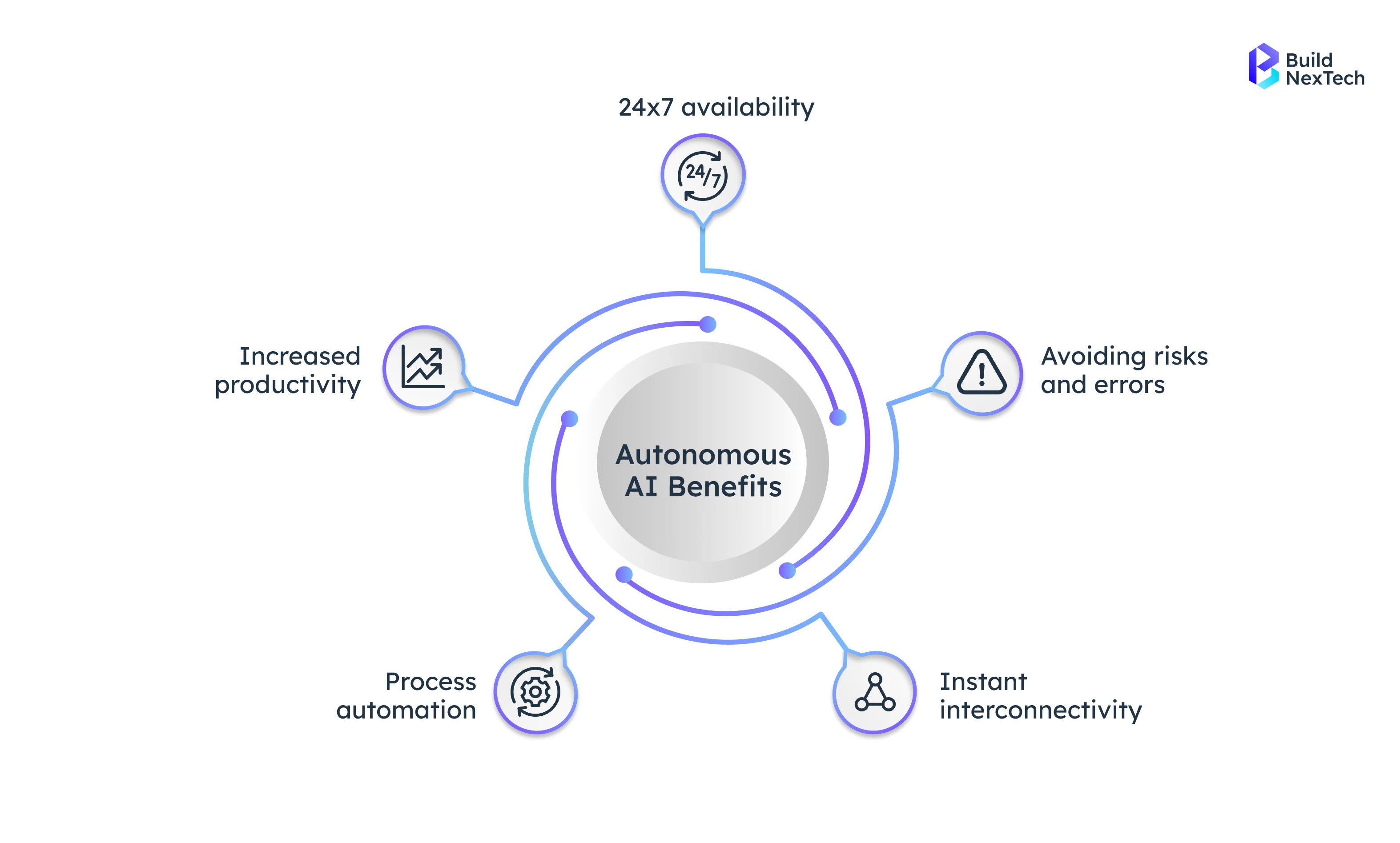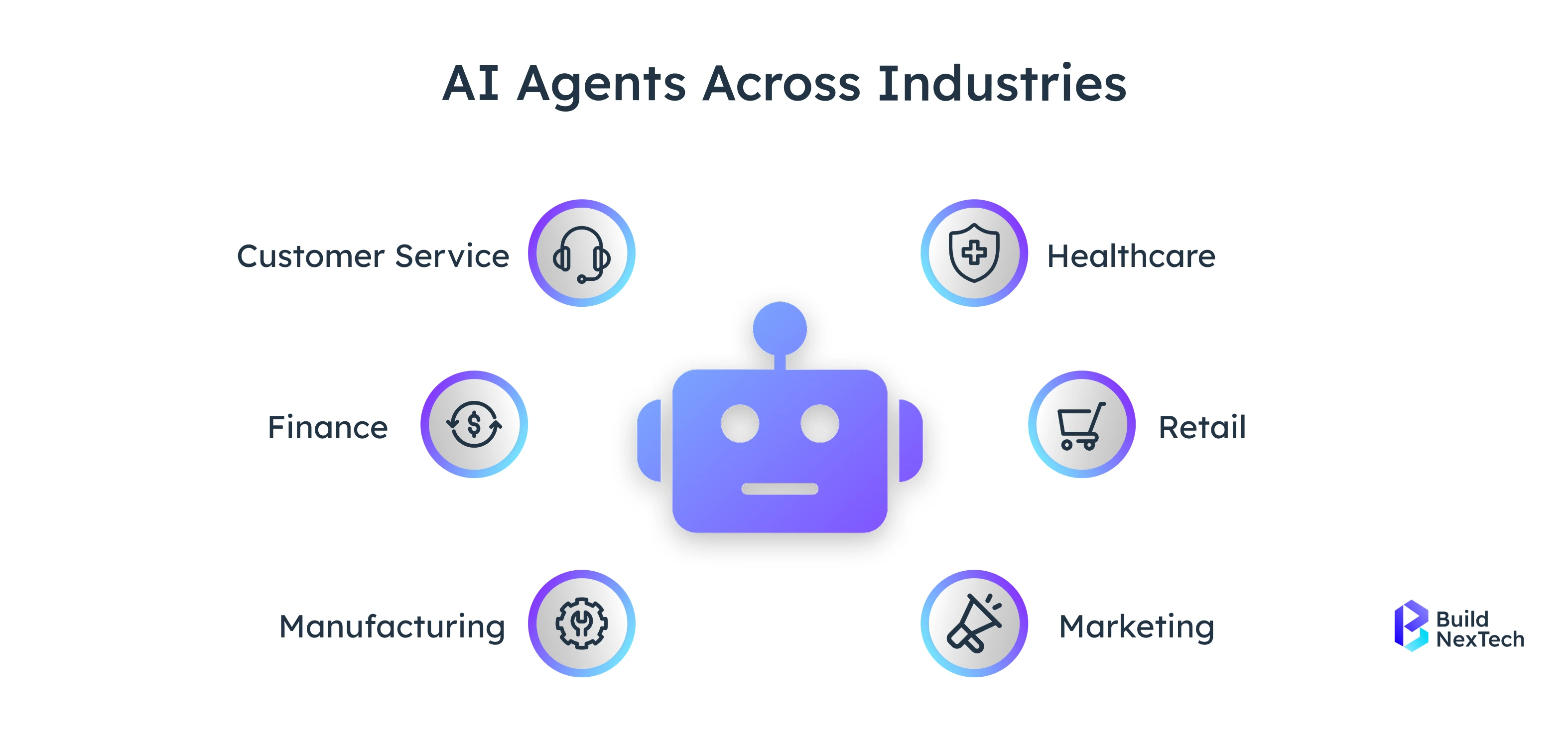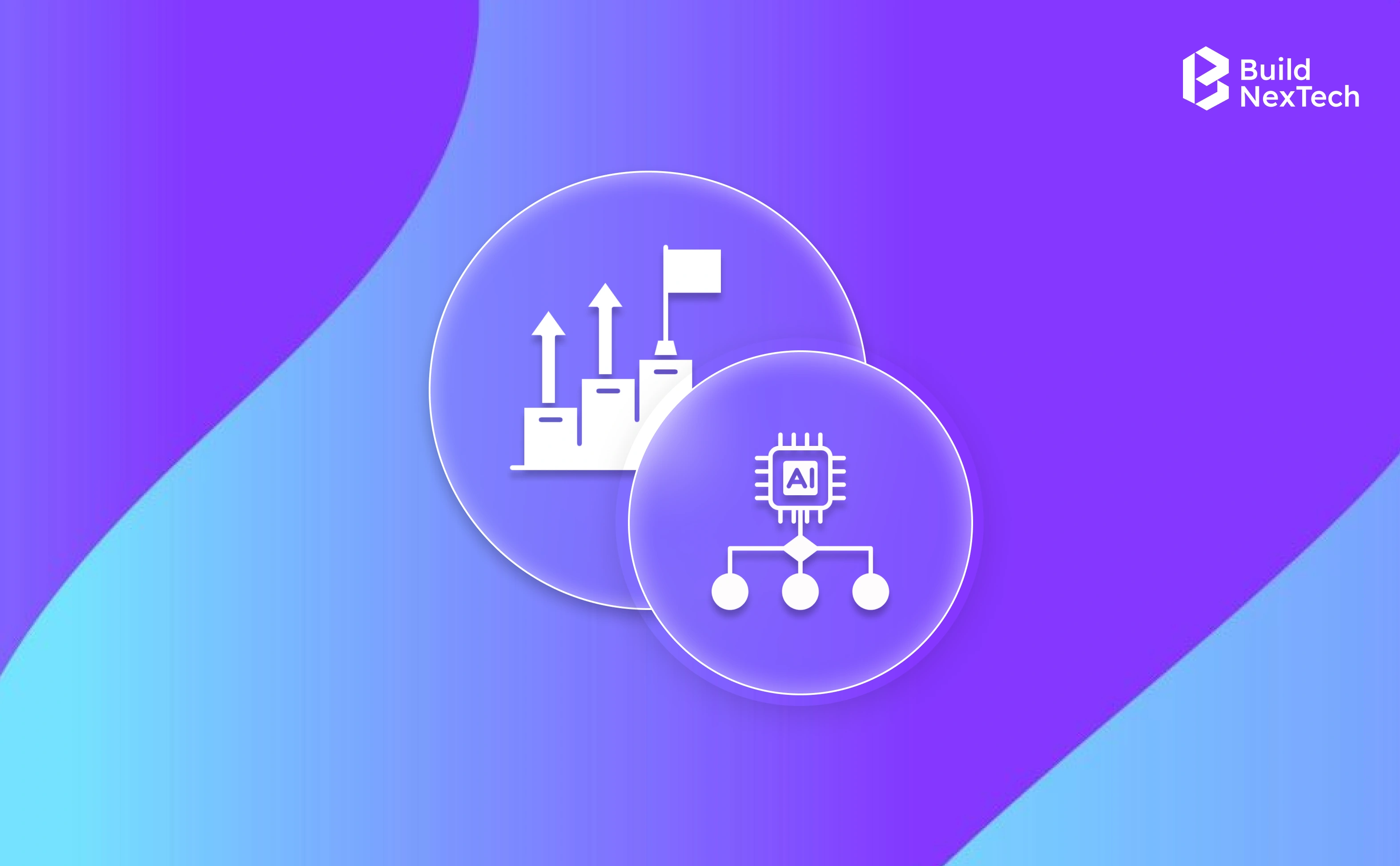The corporate landscape is quickly evolving into the age of hyper-automated environments—where artificial intelligence and automation interface to create highly complicated, strategic decision-making functions that do not require human involvement at all. For companies relying on our services to build an umbrella that is sustainable and agile for the future, stepping into autonomy is one of the most important strategic opportunities. BuildNexTech enables organizations to realize the full value of real autonomous AI-lock-in amazing growth, and achieve sustainable competitive advantage.
✨ Key Insights from This Article:
🤖 Understanding how autonomous AI and Agentic AI redefine automation through self-governing intelligence
🌐 Exploring the autonomous AI landscape and its role in transforming modern business operations
⚙️ Uncovering the strategic value of autonomy in driving efficiency, agility, and cost optimization
🏭 Examining real-world applications of autonomous AI across industries like healthcare, finance, and education
🧭 Learning how to build an AI-ready organization with the right talent, governance, and ethical frameworks
Introduction: The Dawn of Hyper-Autonomous Enterprise
The modern market demands speed, precision, and adaptation. Traditional AI tools and scripting offer limited gains. The future AI technology promises a paradigm shift where systems learn, iterate, and optimize without constant human intervention. This next wave is defined by sophisticated autonomous AI agents that leverage machine learning to drive operations and marketing. Moving beyond basic task repetition is the key to unlocking this value.
Beyond Automation: Understanding Autonomous AI and Agentic AI
While basic automation and artificial intelligence streamlines tasks, autonomous AI introduces agency. This means the system defines its own sub-goals, selects AI tools, and executes multi-step plans to achieve a high-level objective. This shift from reaction to proactive, goal-oriented behavior is often termed Agentic AI.
- Automation: Executes a pre-set rule (e.g., sending a confirmation email).
- Autonomous AI: Defines complex strategy and uses advanced reasoning capabilities to solve problems (e.g., dynamically re-routing supply chain optimization after a regional event).
- Key Differentiator: The system handles unexpected Errors autonomously, utilizing reinforcement learning to improve business resilience.
This independent, intelligent action is redefining the artificial intelligence in business landscape, allowing humans to focus on strategy and ethical oversight, thereby transforming the artificial intelligence in the workplace.

The Strategic Imperative: Why Autonomy is Now Critical for Competitive Advantage
In an unpredictable global economy, the competitive advantage will belong to those that can act on real-time data, act quickly, and have automation on their side. Autonomy is the engine of agility. By investing in autonomous AI, you're future proofing your organization in the event of market shock.
- Unmatched Speed: Autonomous systems make autonomous decision-making possible in milliseconds. This is particularly important in complex verticals like finance or autonomous driving AI.
- Reduced Error: Related to the use of deep learning models, autonomous systems significantly reduce human error and improved quality.
- Scalability: AI technology companies easily scale autonomous operations across regions, providing a significant edge.
- The Global Race: Leaders in AI technology recognize global investments, such as those from China AI technology, making proactive adoption necessary.
Businesses that fail to prioritize understanding AI technology and embracing autonomous capabilities risk being sidelined by agile competitors.
Defining the Autonomous AI Landscape for Business
The realm of autonomous AI represents a shift from conventional automation to systems that can reason, act, and carry out tasks independently. In the business context, it describes how intelligent agents and machine learning models behave to make optimal decisions, improve processes, and create possibilities for growth.
From AI Tools to Self-Governing Systems: A Core Definition
An autonomous AI system perceives its environment, processes Data, makes decisions using sophisticated decision-making algorithms, and executes actions without continuous human control. This is the ultimate expression of sophisticated artificial intelligence and automation.
- Perception: Uses technologies like sensor technology and natural language processing (NLP) to interpret inputs.
- Cognition: Employs advanced machine learning models and Agentic AI to learn from experience and simulate outcomes.
- Action: Utilizes AI tools—from generative AI for content to robotics in logistics—including sophisticated conversational AI technology.
This holistic capability elevates the system beyond a mere tool; it becomes a productive partner in the modern artificial intelligence in the workplace.
Strategic Value of Autonomous AI for Long-Term Growth
The rise of autonomous systems accelerates new opportunities, demonstrating the full potential of AI technology in business.

Unlocking Efficiency, Agility, and Cost Optimization
Autonomous systems allow maximum utilization of resources. Bottlenecks are minimized and resources can be optimized 24 times a day with consistency and high quality.
- Predictive Maintenance - agents can use sensor technology and real-time data to perform predictive maintenance, predicting failures and ultimately reducing downtime.
- Logistics Optimizing - Complex logistics problems can also be fixed autonomously. Agents can autonomously manage inventory and route logistics.
- Accuracy in Finance - autonomous systems in Finance monitor purchases for compliance and with the use of continuous learning paves the way to lower regulatory errors.
- Demand Forecasting: Cost optimization can be achieved through accurate demand forecasting, as autonomous AI predicts market needs precisely, reducing overproduction, inventory costs, and operational waste.
Operational excellence powered with intelligent A.I. technologies is the cornerstone of efficiency.
Transforming Customer Experience Through Intelligent Interactions
Autonomous A.I. aims to redefine the customer experience through tailored and immediate support across the customer journey, in addition to simple customer service bots.
- Hyper-Personalization: AI-powered sales and marketing solutions use agents for artificial intelligence marketing solutions to analyze customer behavior and tailor marketing efforts in real-time, driving customer engagement.
- 24/7 Support: Voice AI technology and chatbots provide high-quality Customer Service and handle complex customer interactions instantly.
- Proactive Service: Agents monitor usage and proactively resolve issues using real-time insights.
The result is a superior level of service that fosters deep customer trust, essential for effective artificial intelligence marketing.
Accelerating Innovation and Adaptability in Dynamic Markets
Autonomous AI acts as an accelerator for research and development, drastically shortening the innovation cycle.
- Drug Discovery: Artificial intelligence in healthcare utilizes agents to simulate thousands of interactions and accelerate research into new AI technology in healthcare, offering advancements in AI technology.
- Adaptive Approaches: Autonomous systems assess and learn from slight shifts in the campaign at the same time and perfect the content immediately.
- Data Analysis and Learning: These systems sort through Data to find insights or correlations human teams may overlook so that the organization continues to be at the front of AI technology.
The rapid and iterative process contributes to business working at speed and in an agile environment. Autonomous AI enables sustainable long-term growth by creating a culture of on-going innovation and responsiveness. Its rapid learning and responsiveness allow organizations to retain a competitive advantage as the market evolves.Ongoing improvement is constructed, and the businesses will have the capabilities for resilience, scalability, and sustainable success through time.
Practical Applications Across Industries
AI technologies deliver transformative results across sectors.
- Healthcare: Examples of AI technology used in healthcare include autonomous diagnostic tools that analyze medical images for early disease detection, improving patient outcomes.
- Retail/E-Commerce: Autonomous agents manage pricing, inventory, and personalized customer engagement.
- Education: AI technology in education provides personalized tutoring and administrative automation, tailoring Learning paths.
- Finance: Autonomous trading bots and fraud detection systems operate with sub-second precision, protecting assets in finance.
BuildNexTech provides bespoke AI technology consulting to tailor these powerful solutions to the unique needs of businesses.

Building an AI-Ready Organization for Autonomous Systems
Success hinges on preparing people and governance structures for human-AI collaboration.
Talent Development and Skills for Human-AI Collaboration
Autonomous AI creates new AI technology jobs focused on system oversight. Upskilling the existing workforce is key.
- New Skills Focus: Employees require skills in prompt engineering and ethical AI governance to manage autonomous AI agents.
- Training Initiatives: Companies must invest in Learning programs focused on deep learning principles for effective collaboration.
- Focus on Creativity: As tasks become automated, human talent moves on to tasks requiring creativity and strategic collaboration.
This move is a strategic investment facilitating the transition to AI and ensuring the advantages of AI are maximized.
Implementing Governance, Ethics, and Change Management Frameworks
While the potential threats of AI technology must be governed, the establishment of ethical frameworks in the AI spectrum is a prerequisite to autonomy.
- AI Governance Models: Organizations need explicit protocols governing auditability to enable and assure autonomously engineered decision-making is normatively aligned with human values. This is pivotal to creating responsible AI technology in business.
- Transparency and Trust: Documents should be available documenting the reasoning of an autonomous agent's decision, expressly for healthcare and financial sectors.
- Change Management: A cogent plan will be implemented to address employees concerns and create a culture of seamless collaboration with humans and autonomous systems.
As a leader in AI technology, BuildNexTech emphasizes establishing these frameworks before full deployment.
Conclusion: Embracing Autonomy for the Future of Business
The road to a durable success and competitive advantage is set with autonomous AI systems. These systems surpass automation in that they can continuously learn, be self-optimizing and predictive to change. Autonomous AI is leading the way to the next wave of advancement in AI technology from logistics optimization and applying AI at a minimum for SMEs, to developing customer engagement and decision-making.
With Agentic AI, ethical frameworks and good governance models, organizations can confidently work within the ambush of AI transparency and trust. BuildNexTech is a trusted partner in your transformation journey. Our firm develops leading-edge technology consulting services that help enterprises become hyper-autonomous and resilient to future disruption. BuildNexTech is focused on scalable, innovative and compliance-driven objectives that secures organizations position among the true leaders in AI led digital evolution.
People Also Ask
How do autonomous AI systems differ from traditional machine learning models?
Autonomous AI systems operate with minimal human intervention, while traditional models rely on human input for training, monitoring, and decision-making.
What industries are expected to benefit the most from autonomous AI in the next decade?
Manufacturing, healthcare, finance, logistics, and energy sectors are poised to gain the most from autonomous AI advancements.
How can companies ensure data privacy while using autonomous AI systems?
By integrating encryption, anonymization, and strict access controls into AI workflows to safeguard sensitive data.
What are the infrastructure requirements for implementing autonomous AI?
Robust cloud or edge computing, scalable data storage, and high-speed connectivity are essential for smooth AI automation.



























.webp)
.webp)
.webp)

